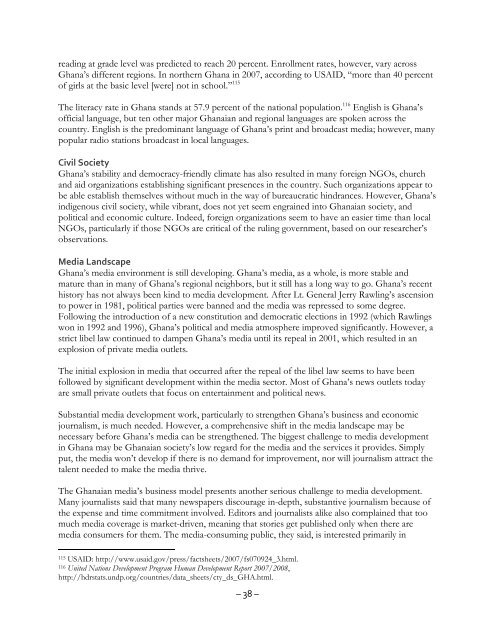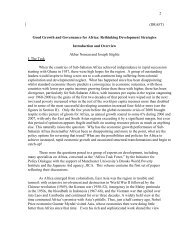eading at grade level was predicted to reach 20 percent. Enrollment rates, however, vary acrossGhana’s different regions. In northern Ghana in 2007, according to USAID, “more than 40 percentof girls at the basic level [were] not in school.” 115The literacy rate in Ghana stands at 57.9 percent of the national population. 116 English is Ghana’sofficial language, but ten other major Ghanaian and regional languages are spoken across thecountry. English is the predominant language of Ghana’s print and broadcast media; however, manypopular radio stations broadcast in local languages.Civil SocietyGhana’s stability and democracy-friendly climate has also resulted in many <strong>for</strong>eign NGOs, churchand aid organizations establishing significant presences in the country. Such organizations appear tobe able establish themselves without much in the way of bureaucratic hindrances. However, Ghana’sindigenous civil society, while vibrant, does not yet seem engrained into Ghanaian society, andpolitical and economic culture. Indeed, <strong>for</strong>eign organizations seem to have an easier time than localNGOs, particularly if those NGOs are critical of the ruling government, based on our researcher’sobservations.Media LandscapeGhana’s media environment is still developing. Ghana’s media, as a whole, is more stable andmature than in many of Ghana’s regional neighbors, but it still has a long way to go. Ghana’s recenthistory has not always been kind to media development. After Lt. General Jerry Rawling’s ascensionto power in 1981, political parties were banned and the media was repressed to some degree.Following the introduction of a new constitution and democratic elections in 1992 (which Rawlingswon in 1992 and 1996), Ghana’s political and media atmosphere improved significantly. However, astrict libel law continued to dampen Ghana’s media until its repeal in 2001, which resulted in anexplosion of private media outlets.The initial explosion in media that occurred after the repeal of the libel law seems to have beenfollowed by significant development within the media sector. Most of Ghana’s news outlets todayare small private outlets that focus on entertainment and political news.Substantial media development work, particularly to strengthen Ghana’s business and economicjournalism, is much needed. However, a comprehensive shift in the media landscape may benecessary be<strong>for</strong>e Ghana’s media can be strengthened. The biggest challenge to media developmentin Ghana may be Ghanaian society’s low regard <strong>for</strong> the media and the services it provides. Simplyput, the media won’t develop if there is no demand <strong>for</strong> improvement, nor will journalism attract thetalent needed to make the media thrive.The Ghanaian media’s business model presents another serious challenge to media development.Many journalists said that many newspapers discourage in-depth, substantive journalism because ofthe expense and time commitment involved. Editors and journalists alike also complained that toomuch media coverage is market-driven, meaning that stories get published only when there aremedia consumers <strong>for</strong> them. The media-consuming public, they said, is interested primarily in115 USAID: http://www.usaid.gov/press/factsheets/2007/fs070924_3.html.116 United Nations Development Program Human Development Report 2007/2008,http://hdrstats.undp.org/countries/data_sheets/cty_ds_GHA.html.– 38 –
entertainment news, scandals, and political squabbles. Thus, that is what gets produced. Businessand economic reportage, in particular, have had a difficult time finding and cultivating a significantaudience. It seems that a major shift in media consumption patterns may be necessary <strong>for</strong> true mediadevelopment to occur.Ghana consistently receives high ratings from press freedom watchdogs. 117 Ghana’s private pressand broadcasters function, <strong>for</strong> the most part, without government interference or harassment. Mediacriticism of the government is generally tolerated, though not without exception.The 2001 repeal of the libel law resulted in an explosion of media “with a plethora of newnewspapers and radio stations coming into existence,” according to the African Media Development<strong>Initiative</strong>’s 2006 report on Ghana. 118 Ghana’s key medium of mass communication is radio, withhundreds of stations filling the dials across the country. The Internet is also making headway intoGhana, though Internet speed remains low and the service is expensive. A recent BBC WorldService report on Ghana’s media notes that “nearly one third of Ghanaians have access to theInternet, and mobile telephones are becoming a significant source of news.” 119Ghana’s print media is divided between a handful of state-owned newspapers (which have thehighest circulation in the country), and dozens of privately owned publications. Ghana’s state mediausually profess a strong commitment to national interests and do not explicitly back political parties(though they tend to support the ruling government), while the smaller private papers often backparticular political parties, serve a niche market, or act as populist muckrakers.Political anthropologist Jennifer Hasty, author of The Press and Political Culture in Ghana, writes that in“positioning themselves against the state media, [Ghanaian] private journalists rely on a globalrhetoric of liberal vocation, identifying themselves as watchdogs in the public interest, free fromstate control and ideological manipulation.” 120 While this observation may ring true <strong>for</strong> some outlets,we discovered that the smaller private papers, while perhaps more feisty, were also more dependenton the market and advertisers than their government-owned counterparts, which are better fundedand more financially (and politically) stable, on the whole.The Ghanaian private media’s fragile business model means that the global economic downturn ishitting it hard. A recent article published on the blog of the International Institute <strong>for</strong> Journalism atInwent (IIJ) noted that Ghana’s newspaper industry is being battered “by an array of challenging<strong>for</strong>ces ranging from changing trends in advertising, rising costs due to the worldwide financial crisisto a decline in circulation arising from economic constraints facing newspaper readers.” 121 Inaddition, print media is suffering because much of its content is increasingly being re-disseminatedby radio, television, and electronic media that consumers do not pay <strong>for</strong>, which undercuts print117 Ghana ranks 31 out of 173 (above the US at 37) on the Reporters Without Borders 2008 press freedom index:http://www.rsf.org/article.php3?id_article=29031.118 Dr Samuel Kafewo, “Ghana: Research findings and conclusions,” The African Media Development <strong>Initiative</strong>(London: BBC World Service, 2006), p. 20.119 “Ghana: Country Profile,” BBC News website, 4 December 2008. Accessed 13 December 2008:http://news.bbc.co.uk/2/hi/africa/country_profiles/1023355.stm#media.120 Jennifer Hasty, The Press and Political Culture in Ghana, (Bloomington: Indiana University Press, 2005) p. 11.121 Kent Mensah, “Financial crisis crumpling Ghana newspapers,” The Daily IIJ,March 5th, 2009: http://inwent-iij-lab.org/Weblog/2009/03/05/financial-crisis-crumpling-ghana-newspapers/#more-477.– 39 –
- Page 1 and 2: THEREWILLBE INKA study of journalis
- Page 3 and 4: AcknowledgementsThis paper has bene
- Page 7 and 8: Executive SummaryPurpose of the Rep
- Page 9 and 10: journalists in these countries that
- Page 11 and 12: Existing International Training Opp
- Page 13 and 14: • Consumer Affairs and Informatio
- Page 15 and 16: Background 3Of the three countries
- Page 17 and 18: pervasive conflict in the Niger Del
- Page 19 and 20: 3) Crises or disruptions, where som
- Page 21 and 22: Low pay and low regardOne of the mo
- Page 23 and 24: Even in cases where working journal
- Page 25 and 26: But while some reporters think FOIB
- Page 27 and 28: When asked how much the media could
- Page 29 and 30: the effects of these challenges for
- Page 31 and 32: detailed analysis of the opportunit
- Page 33 and 34: journalist said he has, however,
- Page 35 and 36: completely make use of some of the
- Page 37 and 38: money. Their knowledge of what medi
- Page 39 and 40: Notes on conducting research in Nig
- Page 41 and 42: Ghana- 35 -
- Page 43: evenues each year,” 106 which wou
- Page 47 and 48: The rise of business-focused journa
- Page 49 and 50: coverage of the oil industry is als
- Page 51 and 52: needed supplementary income to cash
- Page 53 and 54: as supporting one political party o
- Page 55 and 56: Numerous journalists recounted how
- Page 57 and 58: Training programs available to busi
- Page 59 and 60: Amos Safo, editor-in-chief at the p
- Page 61 and 62: Notes on conducting research in Gha
- Page 63 and 64: Background 136Literacy and Educatio
- Page 65 and 66: “sufficient information” about
- Page 67 and 68: or criminal charges for content the
- Page 69 and 70: have such difficulty obtaining info
- Page 71 and 72: The majority of those interviewed b
- Page 73 and 74: commitment to their profession and
- Page 75 and 76: Notes on Conducting Research in Uga
- Page 77 and 78: Recommendations for Revenue Watch I
- Page 79 and 80: people who have no journalism backg
- Page 81 and 82: analyzes business,” he said, “e
- Page 83 and 84: A journalist with The Punch said,
- Page 85 and 86: The Media Foundation for West Afric
- Page 87 and 88: Length of TrainingRoughly three-qua
- Page 89 and 90: industries, for instance, ought to
- Page 91 and 92: otherwise being published in the pr
- Page 93 and 94: Non-Training Recommendations for Ug
- Page 95 and 96:
Appendix A: NigeriaPotential Partne
- Page 97 and 98:
journalists. Biakolo is very profes
- Page 99 and 100:
Television Stations• Nigerian Tel
- Page 101 and 102:
have two to four month professional
- Page 103 and 104:
City: AccraTelephone: +233 (021) 22
- Page 105 and 106:
Fax: +256 414 255 495E-mail: umdf@a
- Page 107 and 108:
• What do you think are the most
- Page 109 and 110:
Appendix E: Survey Questions1. Name
- Page 111 and 112:
18. How effective were the teaching
- Page 113 and 114:
28. What are the most important cha
- Page 115 and 116:
1. Journalists by Country2. How wou
- Page 117 and 118:
5. How often do you travel out of t
- Page 119 and 120:
9. Which organization(s) sponsored
- Page 121:
12. After completing the training(s














